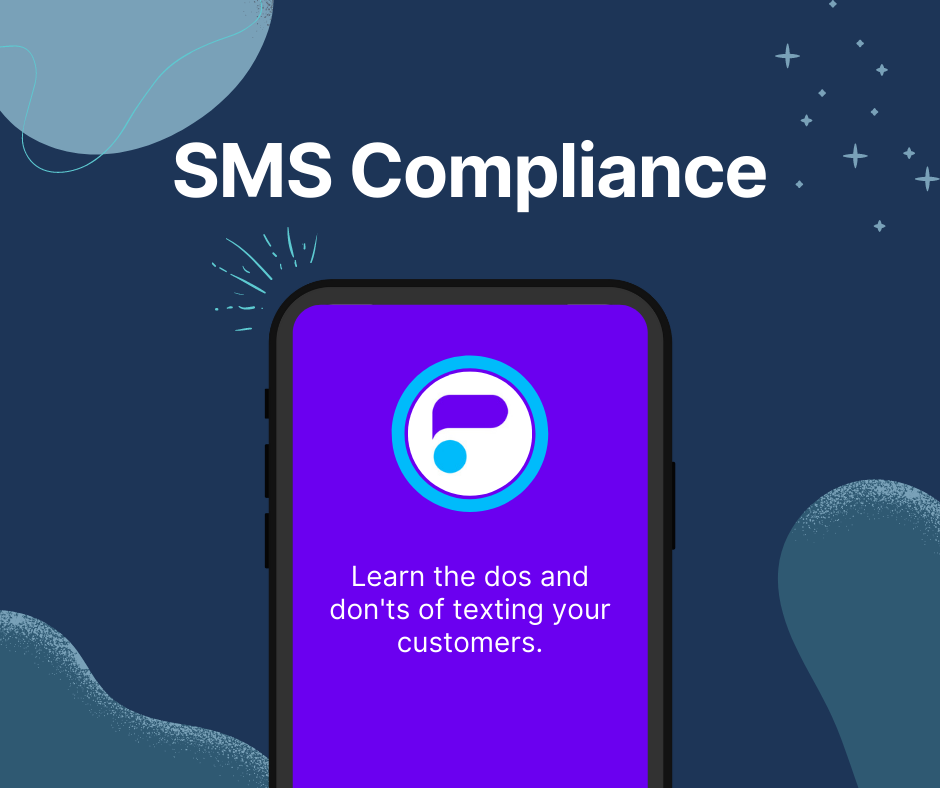SMS Marketing Compliance Guide
Achieve higher SMS engagement, response rates, sign ups, and sales. Avoid penalties, fines, or a ban from using SMS services.

By Mathew Gorka
February 22, 2023
10 min read

SMS marketing, or text message marketing, is the fastest way to get your company/message/promotion in front of your audience. It is arguably the most powerful tool for your business. Before unlocking its awesome power you need to understand the SMS compliance guidelines that exist to protect consumers. Without taking the time to learn and understand these guidelines your company could face fines or other repercussions.
Overview - Compliance
SMS marketing is the most lucrative channel when communicating with customers. Studies show that people average roughly 5.5 hours on their phones daily. With nearly 100% of text messages being read, SMS marketing ensures the vast majority of recipients will see your company’s communication.
With this great power comes great responsibility. There are various associations that have enacted SMS rules to preserve the rights of consumers and prevent companies from exploiting consumer privacy. Out of all of the organizations that oversee text message compliance, the ones whom have the power to enforce SMS laws are:
- Federal Communications Commission (FCC):
The U.S. government agency that regulates all media communications and parental guidelines. - Federal Trade Commission (FTC):
The federal agency that oversees complaints of theft, violence, and deception through media and enforces laws.
We recommend clicking the above links to learn more about SMS compliance directly from the organizations that create and monitor these regulations.
SMS Compliance Checklist
Now that you are aware of the framework and familiar with the agencies who monitor it, here are some critical steps you can take to comply:
1. Clearly Outline Program Details at Opt In
When it comes to text messaging compliance, your campaign’s messages must be promoted with clear, simple, and legible language. This includes items like:
- The name of your business
- Your messaging cadence (how often you will be communicating)
- Notice about data/text message rates or fees that may be incurred by the recipient
- A straightforward explanation or link to your terms, conditions, privacy policies
- An easy and reliable way for the recipient to Opt-out of your communications
2. Prior Written Consent
An imperative step, SMS compliance laws place heavy emphasis on consent. The TCPA states that, to text consumers marketing messages, every company must receive express written consent first.
Warning: Texting consumers without authorization can cost you or your organization fines ranging from $500 to $1,500 per incident. The implications when bulk messaging add up quickly.
So, what can you do? You must obtain express written consent first. A great place to start is with online forms, prompts on your site, or links within emails (to subscribers). Make sure you explicitly state that enrolling or authorizing SMS communications means that subscribers agree to receive text messages from your company.
3. Confirm Opt-Ins
This confirmation step goes a long way to ensuring your company’s compliance. A double opt-in measure, the TCPA requires organizations to text recipients a disclosure message to confirm their participation in your SMS program. The disclosure message reiterates the details of your SMS program opt-in.
4. Clearly Communicate Terms and Conditions
Creating a page that outlines the full details of your SMS policy before launching your campaign is critical. The page should be easily findable via a link that is associated with your organization.
To start, provide your terms and conditions link in the initial disclosure text. You will want to continuously inform your customers of the policy and its accessibility. Notify subscribers whenever the terms and conditions are changed or updated.
5. Time Your Texts Appropriately
The TCPA explicitly states that you cannot text or call subscribers before 8:00 AM or after 9:00 PM local time. Communicating with your audience outside of this time window is in violation of SMS marketing compliance laws, and your organization will be susceptible to fines or other repercussions.
6. Enable Easy Opt-Out
A key piece of SMS compliance is the opt-out process. You must make it clear and easy for subscribers to opt out of your SMS program at any point.
Recipients should be able to text “STOP” or another simple keyword to unsubscribe from marketing text messages. Sending opt-out instructions maintains text message compliance. They should be included with every campaign.
7. Don’t Message Opt-Outs
The National Do Not Call Registry, which also applies to SMS marketing, states that it is illegal to text anyone on its registry list including subscribers who have opted out of SMS communications. Further, once a recipient of your marketing communication has replied by opting out, they should be removed from your messaging list at once. Reaching out to this contact again is a violation.
8. State Your Business Name in Every Message
Transparency is key. To maintain full transparency with SMS subscribers, you must include your business entity’s name in every message.
9. Don’t Use Banned Language
The arm of SMS compliance requirements includes the content of your message. The CTIA rule known as SHAFT prohibits companies from sending content on the topics of or related to:
- Sex
- Hate
- Alcohol
- Firearms
- Tobacco
This applies to any promotion, loyalty outreach, or other communication of your SMS marketing program. If your company sells alcohol or tobacco it must include an age gate (a prompt that ensures the recipient is of appropriate legal age). If there is an age gate, and the recipients are opted-in and of legal required age, the company may message its audience about deals and specials.
It is critical that all companies write in appropriate and permitted language. Breaking this rule will put your company in jeopardy of being banned from sending text messages.
SMS Compliance Key Terms
Opt-In
An SMS opt-in is the act a consumer takes to enroll in your SMS program.
Opt-Out
An opt-out occurs when subscribers indicate they no longer agree to receive SMS messages from your business. Companies are required to remove opted-out subscribers from all messaging lists, cease outreach or any further communications at the risk of penalties.
Express Written Consent
Mandatory permission that must be obtained by a company before they may text a consumer, as outlined by the FCC. Acceptable forms of provided express written consent (by the consumer) are:
- Checking a box on a website form
- Verbally recorded agreement to opt in
- Texting a code to a designated number
Transactional Text Message
Text messages sent with the sole purpose of updating or informing customers of essential information. This may include items like order confirmations, cancellations, identity authentication and shipping tracking, or other order updates.
Promotional Text Messages
Unlike transactional messages, promotional text messages require prior express written consent (see above). Promotional text messages, also referred to as SMS Marketing messages, are sent to consumers with the purpose of generating sales or engaging an audience with nonessential information. Examples include product launches, sales, or special offers.
Privacy Policy
Readily available literature that discloses any personal information that your organization collects from consumers. Also, it should include how the data is used and the steps your company takes to protect the personal information (PII) that you acquire. We recommend additional reading on privacy policy best practices.
Terms and Conditions
A document that details your SMS program. It must include the types of messages consumers can expect to receive, your texting cadence, notice about message and data rates, your privacy policy, opt-out instructions and other terms of use.
Text Spam
Any unsolicited text messages sent to consumers who did not previously provide express written consent to the sender’s organization.
SMS Compliance Takeaways
Businesses must prioritize SMS compliance. Staying in good standing with customers is critical to your business, remaining compliant with the law is mandatory. Abiding by all compliance guidelines ensures that your business is only texting customers who are interested in communicating. Aside from the benefits of higher engagement such as response rates, sign ups, and sales, your business will also avoid penalties, fines, or a ban from using SMS services.
Note: Helios reserves the right to end the service of any company that it feels has abused these regulations at any time.
Disclaimer: Please note that this is not legal advice and is for informational purposes only. Your company and associates assume full responsibility in all legal matters.
Ready to level up your text message marketing?
